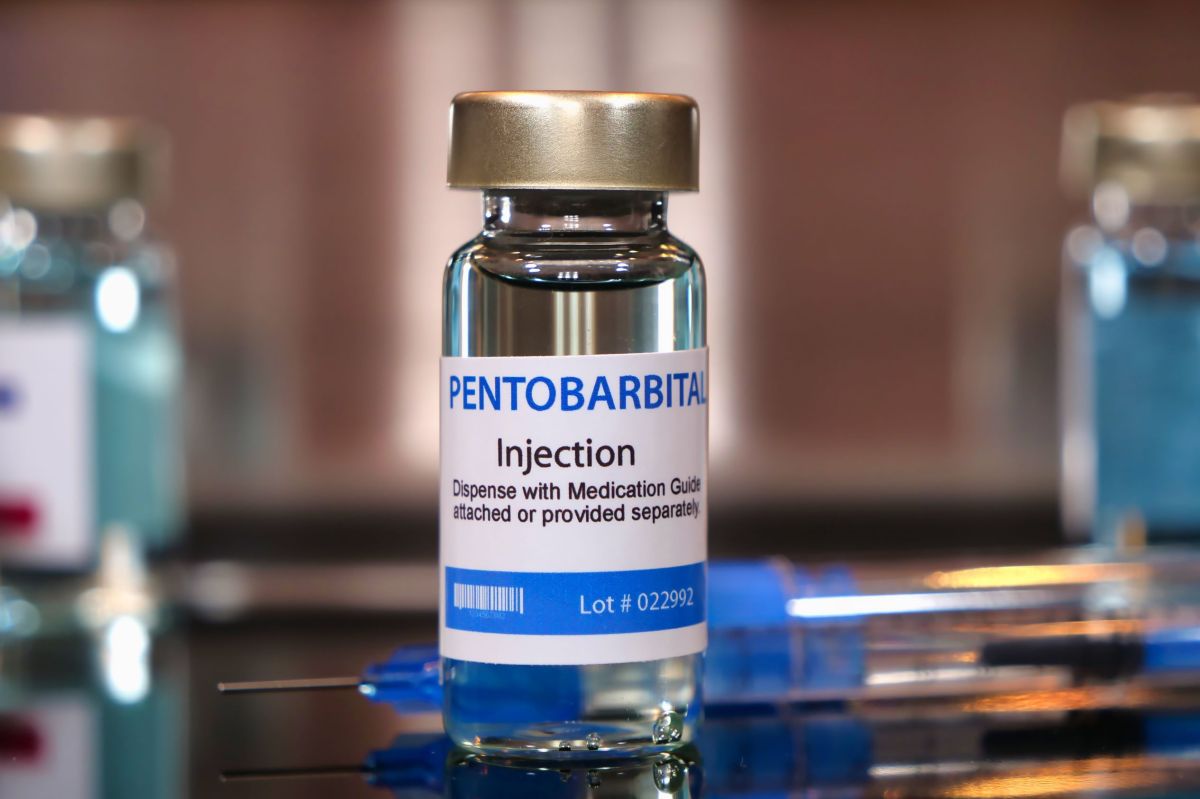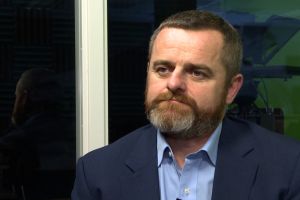
Little is known about how Indiana acquired pentobarbital, a drug that state officials plan to use to restart executions for the first time in more than a decade. (Bernard Chantal/Adobe Stock)
After state officials announced last week that Indiana will resume executions for the first time in over a decade, secrecy largely shrouds the new drug, pentobarbital, acquired for the impending lethal injections.
The one-drug method is a departure from the state’s protocol used since 1995, involving a series of three chemicals.
Although no state-level executions in Indiana have used pentobarbital before, 13 federal executions carried out at the Federal Correctional Complex in Terre Haute have been carried out with the drug. Fourteen states have used pentobarbital in executions, too.
But state and federal officials alike have remained closed-lipped about where pentobarbital is sourced from and how much it costs. Also still unknown is the amount Indiana has acquired and when the current doses expire.
Robin Maher, executive director of the Death Penalty Information Center (DPIC), a nonprofit based in Washington, D.C. that tracks state and federal executions, said it’s also critical for the public to know who will be administering the drug — and how — as well as what training those individuals will receive.
“These are the hard questions that have to be asked,” Maher told the Indiana Capital Chronicle. “This is an official government function, and in a democracy, we value honesty and transparency in our government officials and the acts they do on our behalf. This is absolutely one of those official acts, and voters in Indiana deserve to know what their government is doing in their name.”
What is pentobarbital?
The Hoosier state has carried out 20 executions since 1981. The first three — in 1981, 1985 and 1994 — were by electrocution. The rest have been by lethal injection — which is now the only method permitted by state law.
The Indiana Code doesn’t specify what drugs are to be used for executions, saying only that the drugs must be injected intravenously in a quantity and for an amount of time sufficient to kill the inmate.
Previously, when a prisoner was executed by lethal injection in Indiana, they were strapped to a gurney, and an IV line was inserted to inject a lethal combination of three substances: a barbiturate to render the person unconscious; pancuronium bromide to paralyze voluntary and reflex muscles; and potassium chloride to stop the heart.
But after Indiana’s last execution in 2009, the state was effectively forced to pause. Increased scrutiny of lethal injection drugs led pharmaceutical companies to refuse to sell their products for use in executions. Indiana Gov. Eric Holcomb said that made acquiring the necessary drugs “harder to get.”
It wasn’t until last week that the governor, along with Indiana Attorney General Todd Rokita, announced that the state’s Department of Correction has obtained the pentobarbital to carry out the death penalty.
The state is so far seeking an execution date for Joseph Corcoran, a man convicted in the killings of four people in Fort Wayne in 1997. There are currently eight men on Indiana’s death row, including Corcoran. No one has been added to the state’s death row since 2014.
In the one-drug executions, a prisoner is injected with an overdose of pentobarbital. The new drug, which Maher described as a sedative, has commonly been used to euthanize pets.
“It’s a barbiturate that explodes the activity of the brain and the nervous system and breathing,” she said. “When you’re given an overdose of that, it will ultimately suppress breath and kill you.”
Pentobarbital was first introduced in 2010, according to the DPIC.
So far, 14 states have used the drug in executions: Alabama, Arizona, Delaware, Florida, Georgia, Idaho, Mississippi, Missouri, Ohio, Oklahoma, South Carolina, South Dakota, Texas and Virginia. Five additional states — Kentucky, Louisiana, Montana, North Carolina and Tennessee — additionally plan to use pentobarbital. Colorado includes pentobarbital as a backup drug in its lethal-injection procedure.
The same drug was also used for the 13 federal executions during the last six months of Donald Trump’s presidency.
Listen: Rush to Kill
In 2019, former U.S. Attorney General Bill Barr approved the use of pentobarbital in executions, though President Joe Biden’s Justice Department announced a moratorium on federal executions in 2021.
A first-time method in Indiana
Whether Indiana uses pentobarbital or other drugs for executions, Maher said there are still concerns about what could go wrong.
She noted that lethal injections have the highest rate of botched executions, which occur when there is a breakdown in — or departure from — the “protocol” for a particular method of execution.
The DPIC describes at least two botched executions that have occurred in Indiana.
In October 1985, it took 17 minutes to execute William Vandiver. Still breathing after the first application of 2,300 volts, four more bursts of electricity were fired into him before he was pronounced dead, according to media reports from that time. The Indiana Department of Corrections admitted the execution “did not go according to plan.”
Tommie Smith, who died by lethal Injection in July 1996, also had a prolonged execution, according to the DPIC. Because of unusually small veins, it took more than an hour after the execution team began sticking needles into his body for Smith to be pronounced dead. After multiple attempts, the lethal drugs were finally injected into Smith 49 minutes after the process began. It took another 20 minutes before he was pronounced dead.
Read more: Holcomb dismisses concerns about executions using new drug
Maher said many of the documented botched executions in recent years have occurred because the drugs being used had expired, were contaminated, or they were administered “incorrectly.”
“There are a number of ways that the executions can go wrong, and it doesn’t only have to do with the kind of drug that is used,” she said, noting, for example, that if pentobarbital isn’t stored at a proper temperature, the drug can expire and should not be used.
When asked where DOC acquired the drug — pentobarbital, which can be used to carry out executions – and how much the state paid, Holcomb said he “can’t go into those details, by law.”
Lawmakers made information about the source of the drugs confidential on the last day of the 2017 legislative session.
Indiana Capital Chronicle has filed an official records request seeking the cost of the drugs.
“States have been hiding this information behind secrecy statutes in an effort to avoid answering difficult questions about their execution protocols. These are elected officials. They are using government funding, and they are saying they are conducting an official function,” Maher said. “And all of that means they should be honest and transparent about what they’re doing and why. The fact that they have shrouded everything in secrecy in an attempt to avoid answering these questions is not something that we should simply be accepting.”
Recent reporting by The Intercept and Last Week Tonight with John Oliver identified Connecticut-based Absolute Standards as the source of the pentobarbital used in 13 federal executions in 2020 and 2021. Reporting did not confirm if the company also supplied to specific states, including Indiana.
Absolute Standards produces materials for calibrating research equipment, but in 2018, it applied to the Drug Enforcement Administration to be registered as a bulk producer of pentobarbital. The company has since indicated that it will no longer produce the drug.
Read more: Company accused of supplying pentobarbital for federal executions in Terre Haute ends sales
Maher further pointed to Idaho, which reportedly spent $100,000 earlier this year to purchase three doses of pentobarbital, the drug used in lethal injections. It’s not clear if that’s the same quantity purchased or price paid by Indiana, however.
Need to get in touch?
Have a news tip?
“What officials have said … is that they do not want to have people who are involved in the execution process — for manufacturers of a drug — to be harassed by advocates. But there are almost no real life examples of that happening unless we characterize criticism as harassment, which I don’t think we should in a democracy,” Maher said. “People who are critical of decisions the state is making, in terms of where they are finding their drugs and how they are choosing to administer them, that’s part of being a public official. Responding to those questions from your constituents — that’s part of being a public official. That comes with the territory, and there is no justifiable reason for them to avoid answering those questions.”
The Indiana Public Defender’s Office, which is providing Corcoran with legal counsel, did not reply to the Capital Chonicle’s requests for comment about pentobarbital or the impending execution.
Larry Komp, a federal defender for Corcoran, said the legal team is still seeking clarity on the state’s lethal injection protocol.
Groups are starting to come out against Indiana’s move, including the Libertarian Party of Indiana.
“A government whose primary function is to protect life should not be in the business of ending it, especially given the United States Constitution protects the accused from cruel and unusual punishment. There is no more cruel punishment than putting someone to death,” the party said in a statement. “The state, simply put, should not be killing its citizens. The Libertarian Party of Indiana calls upon Governor Holcomb and the State of Indiana to halt all planned executions and, furthermore, upon the General Assembly to ban the use of the death penalty in Indiana.”
GET THE MORNING HEADLINES DELIVERED TO YOUR INBOX
Indiana Capital Chronicle is part of States Newsroom, a nonprofit news network supported by grants and a coalition of donors as a 501c(3) public charity. Indiana Capital Chronicle maintains editorial independence. Contact Editor Niki Kelly for questions: info@indianacapitalchronicle.com. Follow Indiana Capital Chronicle on Facebook and X.











